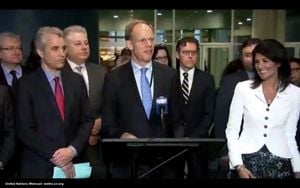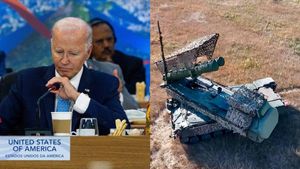With the appointment of President-elect Donald Trump’s cabinet members drawing attention, the political world is abuzz with speculation about the directions these key officials will take. The former real estate mogul turned politician has been vocal about his ambitions for the United States, and the individuals he’s chosen for various roles are set to play significant parts as he aims to implement his policies. Let’s take a closer look at his cabinet appointments and their potential impacts.
Trump's choice of cabinet members reflects his commitment to shake up the establishment. Former ExxonMobil CEO Rex Tillerson is set to head the State Department, which raised eyebrows due to his close ties with Russia. Critics worry about the implications of this connection, especially as tensions between the U.S. and Russia remain fraught. Supporters, on the other hand, point to Tillerson's extensive international experience as beneficial for US diplomacy.
The nomination of Jeff Sessions, attorney general and long-time Alabama senator, also stirred controversy. Critics fear his record on civil rights could lead to rollbacks of protections for minorities. Sessions has expressively backed aggressive stances on illegal immigration and crime, reflecting Trump’s campaign rhetoric. His appointment could potentially shape law enforcement policies critically, especially among marginalized communities.
Meanwhile, Ben Carson, who has been tapped for the role of secretary of housing and urban development, presents another interesting case. Carson, renowned for his medical career, has limited political experience. His supporters believe he can bring fresh perspectives to urban development issues, but others question his qualifications to lead such complex challenges.
On the economic front, Trump's choice of Steven Mnuchin as Treasury Secretary is noteworthy. Mnuchin has extensive Wall Street experience and is expected to push forward Trump's policies on tax reduction and deregulation, key components of his economic vision. Advocates argue these measures will stimulate growth, but they also voice concern about potential drawbacks like increasing the national debt or exacerbated income inequality.
Trump is also considering appointing former New York City Mayor Rudy Giuliani to lead the Department of Homeland Security. Giuliani’s tough-on-crime reputation portrays him as someone who could bring order, which appeals to Trump’s base. Critics, again, express worry about authoritarian tendencies based on Giuliani's past as mayor.
Across the board, these appointments indicate Trump's preference for outsiders to establish his administration's mission. He seems to favor hard-charging individuals who are aligned with his goals of creating jobs, cutting regulations, and enhancing military strength. Yet, his cabinet selections prompt debates among lawmakers and citizens alike about the balance of experience, controversial opinions, and the potential risks involved.
Understanding the backgrounds of Trump's appointments is pivotal. His administration marks itself distinctively, wanting to disrupt conventional governance. Each secretary is expected not only to administer respective departments but also to echo Trump’s broader agenda. For example, if Tillerson opens diplomatic channels with Russia as many speculate, how will this reshape existing geopolitics?
Trump's plans for reform extend beyond just cabinet appointments. He has laid out ambitious policy proposals on health care, infrastructure spending, and immigration. For health reform, he envisions dismantling the Affordable Care Act, often referred to as Obamacare, using his cabinet to push forward comprehensive changes. This will likely face stiff resistance from Democrats and advocacy groups who argue for the protections afforded under Obamacare.
Infrastructure is another focal point. Trump is pledging to revitalize American roads, bridges, and airports, appealing to both rural and urban voters. His infrastructure vision leans heavily on joint public-private partnerships, aimed at leveraging significant investments without overwhelming the federal budget.
Immigration stance is perhaps the most polarizing aspect of Trump’s platform, having garnered him substantial support yet equally fierce opposition. He proposes stricter immigration laws and the construction of the much-talked-about wall along the U.S.-Mexico border. How his cabinet members align with these plans, particularly with regard to enforcement practices, will likely set the tone for national debates.
Overall, Trump's cabinet picks and proposed policies represent both continuity and change within U.S. politics. They contain elements of traditional conservatism intertwined with Trump’s distinct brand of populism, creating both excitement and trepidation within various constituencies.
Moving forward, the success of Trump's policies will hinge upon his ability to unify these diverse perspectives within his cabinet, find consensus with Congress, and address the concerns raised by opposition groups. How effectively he navigates this uncharted territory could define not only his presidency but also the future political climate of the nation.



